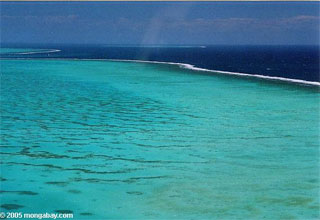Great Barrier Reef in trouble says Australian scientist
Worst bleaching on record possible
Rhett A. Butler, mongabay.com
February 1, 2006
Australia’s Great Barrier Reef may be at risk of one of its worst coral bleaching events on record warned a leading Australian scientist Tuesday.
Ove Hoegh-Guldberg of the University of Queensland told the Australian Broadcasting Corp. (ABC) that current temperatures suggest that this year’s bleaching event could rival that of 2001-2002, which affected 60 percent of the reef.
Coral bleaching occurs when corals lose their symbiotic algae which provides them with nourishment and energy. Bleaching results when corals are physiologically stressed–as is the case when water temperatures are elevated. Corals can recover from short-term bleaching, but prolonged bleaching can cause irreversible damage.
The first coral bleaching event was detected in 1979. Since then, there have been six events, each of which has been progressively more frequent and severe. In the El Niño year of 1998, when tropical sea surface temperatures were the highest yet in recorded history, coral reefs around the world suffered the strongest bleaching on record. 48% of reefs in the Western Indian Ocean suffered bleaching, while 16% of the world’s appeared to have died by the end of 1998. More recently, NASA and National Oceanic and Atmospheric Administration reported that during September and October of 2005 while hurricanes battered the Gulf of Mexico, the Caribbean experienced one of the most devastating coral bleaching events ever recorded. According to scientists in Puerto Rico, the bleaching was both widespread and intense with colonies representing 42 species completely white in many reefs. Surveys showed that 85 to 95 percent of coral colonies were bleached in some areas, while reefs in Grenada suffered close to 70 percent bleaching in some areas.
 The Great Barrier Reef. Photo by R. Butler |
Hoegh-Guldberg’s warning over the health of the Great Barrier reef is not his first. In 2004, Hoegh-Guldberg and his colleagues said that Australia’s Great Barrier Reef could lose 95 percent of its living coral by 2050 should ocean temperatures increase by the 1.5 degrees Celsius projected by climate scientists. The combination of higher water temperatures and increased ocean acidity due to high concentrations of dissolved carbon dioxide in the world’s oceans would be the leading factors responsible for such a demise.
Other than reducing greenhouse gas emissions, very little can be done to turn the tide in the long-term. For the short-term, Hoegh-Guldberg said he is praying for two months of stormy weather to stir up colder water — the only thing that will save the coral from the current high temperatures. However, scenario of warm waters and bleached corals is likely to repeat itself in the near future.
“No one with any credibility in this field is doubting that we’re seeing the first signs of a major change in an ecosystem due to climate change,” Hoegh-Guldberg told the ABC. “It simply underscores the absolutely critical importance of getting global greenhouse emissions under control because we could end up with a world where we don’t have the Great Barrier Reef — that would be an absolute tragedy.”
The 1400-mile long Great Barrier Reef plays a key role in the Australian economy, attracting more than 2 million tourists a year who spend some $3.3 billion of reef-related industries. The loss of this natural attraction would not only have a significant impact on employment in the Queensland region, but would also impact local fisheries and other ecosystem services.
Recent reef articles
Coral reefs and mangroves have high economic value January 24, 2006
Protecting coral reefs and mangrove forests makes economic sense according to a new report by the United Nations Environment Programme (UNEP). The report, titled “In the Front Line: Shoreline Protection and other Ecosystem Services from Mangroves and Coral Reefs”, argues that conserving these ecosystems for the services they provide—from fisheries protection to erosion control to a source for medical compounds—is cost-effective relative to destroying them and substituting their role with man-made structures.
Caribbean reefs suffer severe coral bleaching event December 20, 2005
The Caribbean experienced one of the most devastating coral bleaching events on record during September and October while hurricanes battered the Gulf of Mexico. In response, NASA and National Oceanic and Atmospheric Administration (NOAA) have sent a team to assess the situation.
Coral reefs decimated by 2050, Great Barrier Reef’s coral 95% dead November 17, 2005
Australia’s Great Barrier Reef could lose 95 percent of its living coral by 2050 should ocean temperatures increase by the 1.5 degrees Celsius projected by climate scientists. The startling and controversial prediction, made last year in a report commissioned by the World Worldwide Fund for Nature (WWF) and the Queensland government, is just one of the dire scenarios forecast for reefs in the near future. The degradation and possible disappearance of these ecosystems would have profound socioeconomic ramifications as well as ecological impacts
Dubai’s artificial islands have high environmental cost August 23, 2005
Dubai has lately embarked on an ambitious plan to boost its international standing in the eyes of the world’s rich (and its neighbors) by building a number of artificial islands. These islands, which will house luxury residences, villas, and hotels, are a growing concern for environmentalists due to their impact on the local marine ecology.